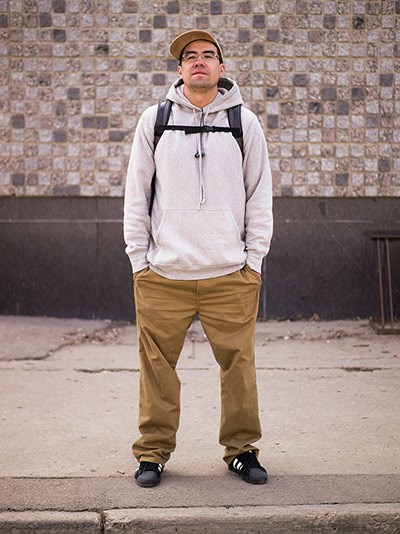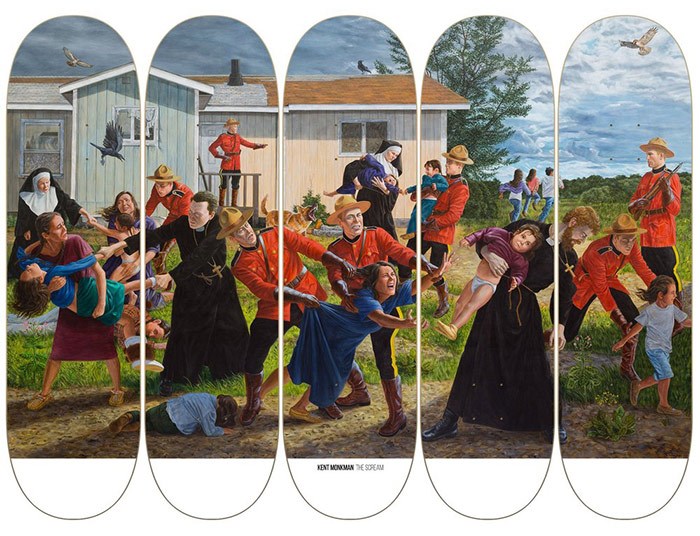One day, when the topic of what “first nations land” meant came up while driving my son to school, I started in timidly with an explanation to my then six-year-old son. I certainly wasn’t confident in my knowledge, but I was going to lay it out for him as best I could. Before I got anywhere though, he interrupted me by saying something along the lines of, “Oh, I know. We acknowledge that we are on the shared traditional territories of the Coast Salish peoples and acknowledge the Musqueam, Squamish, Capilano, and Tsleil-Waututh Nations.” Clearly this topic was covered consistently at his East Vancouver school, and our education system has evolved since I was his age.
I should know more about the history of aboriginal people in Canada. All of us should know more. Despite going to a high school built on land that was immediately adjacent to a first nation community, I believe I learned embarrassingly little. While I’ve tried to inform myself more over the years, my kid still blew my socks off when he schooled me on his way to school.
As the editor of a national skateboarding magazine, I jump at any chance to cover people and happenings related to skateboarding that touch on more than just the act of skating itself. When I heard that Mike Langan, a skateboarder from Regina, had started a skateboard company with a visual focus designed to educate people on First Nations history in Canada, I got on the phone with him to learn more. —Jeff Thorburn
Interview with Mike Langan, founder of Colonialism Skateboards
 Mike Langan of Colonialism Skateboards. Photo: Noel Wendt
Mike Langan of Colonialism Skateboards. Photo: Noel Wendt
What is Colonialism Skateboards all about?
It's based out of Regina, Saskatchewan in Treaty Four territory. The primary objective for the company is to educate the public on elements of our shared history and the culture of aboriginal peoples in Canada through our love for skateboarding, you know? I remember prior to starting the company, I was educating myself on the First Nations history and Canada. I kept on thinking of ways to educate people on this history. One day I thought, oh man, I should start a skateboard company.
How did you choose the name?
I remember telling some people that I wanted to call it Colonialism. They were like, "What's colonialism?" And I was like, yeah that's it. That's why I want to fucking call it Colonialism, because nobody knows about our colonial past or colonialism that's happened in Canada.
So tell the readers what colonialism is.
Colonialism is the policy of practicing or acquiring full or partial political control over another country, occupying it with settlers, and exploiting it economically. So, that's the whole thing. That's the history, you know. With the Royal Proclamation coming into play. The Royal Proclamation came in at like 1763. So the Royal Proclamation was a document that was like—it set up the guidelines of European settlers in Aboriginal territories of what is, I guess now, North America. The Royal Proclamation was initially issued by King George III in 1763 to officially claim British Territory in North America after Britain won the Seven Years War. The Royal Proclamations states that Aboriginal title has existed and continues to exist to this day. So then this gave birth to the treaty rights, and that's how the treaties were signed.
Now that you've got this out there, when you encounter non-Aboriginal people, particularly skateboarders, do they generally have any idea of the basics of what this is all about? Like the history of Canada or North America?
Well, that's the thing. This side of history has been omitted from the history books, you know? It's like, historically, Aboriginal peoples were either omitted from the accounts of Canadian history or they're depicted as savages or freeloaders or needy Indians. Colonizers or the settlers were often depicted as great pioneers in the textbooks. So a lot of people don't understand or haven't been taught the history of First Nations people in Canada. A lot of people don't know. I guess it all depends on the education, who's teaching you in these schools. I think there's some people who know. But now, with the company, there's some people out there who do know—like the first board, the Pass System, no one knew about the Pass System. They didn’t know about when it was implemented and what it did to First Nations peoples’ lives. I get messages from people, like just direct messages: "Hey, I didn't know anything about the Pass System." You know, it's like, "That's pretty cool what I learned from it. It's pretty devastating, but it's good history, right?"
What is your experience in a school setting? Did you learn about this stuff at school, yourself?
No, no, I didn't know anything about this.
Did you know about it from outside of school? From family discussions?
Well, that's the thing, my mom—when I told her about the Pass System and what the first graphic was going to be. I was talking to my mother and she remembers the Pass System. She remembers the Indian agents on the reserve giving out these documents for First Nations people to leave the community for however long they were going to or however long they're approved for. So she remembers that and she remembers her dad and her mom talking about it, and she remembers my great-grandparents talking about it as well.
But you didn't know much about it when you were younger.
No, I didn't know anything. Even with the residential school, too. No one talked about it. But now, obviously, it's out there with the Truth and Reconciliation. And all the recommendations and all that. So lots of people know about that history now. They're starting to. And I know in schools now they're implementing that history into classrooms, which is freaking awesome. It's pretty cool.
What's been the reaction to Colonialism Skateboards from the First Nations community around you?
They're super supportive. Yeah, they're pretty stoked on the company. They're very happy with the history that I'm sharing with everyone. I went to the Aboriginal centre at the university and I showed the folks there the next graphic that I have coming out. And they're like super stoked on it, just like, with the history attached to it. The graphic—it's an award winning book. It was a national best-seller. The book's called Clearing the Plains. It's a history on the disease politics of starvation and the loss of Aboriginal life. It highlights colonialism, colonization, genocide—and Sir John A. Macdonald facilitating genocide on First Nations peoples.
So that's like the next board. But going back to the original question, there are lots of First Nations people who support the company, that really love what the company's all about. And same with non-indigenous people, too. They're super like supportive of the company. Because it's just about education, right? It's about educating people on a shared history. It's about reconciliation. It's about truth. It's about getting that out there so our future generations can work together with one another. So I don't know why anyone would not want to support that.
You’re right.
It’s kind of cool too because skateboarding in a way is like education in itself, right? It's education on the streets. It's educating your body, your spirit—everything, man. And putting education on the skateboard just goes so well.
Will you keep going at the same pace you are right now, moving forward?
Yeah, yeah, totally. I already have—oh man, I have so many ideas. I have an artist in Toronto right now working on a graphic, and then I have another artist who just sent me a file, like a photo, and then I have more images coming from the Saskatchewan archives. So yeah, I'm going to just keep on going. Keep on going and going. I have like a plan of around five years of graphics that I could do. I just got to think up the ideas. Like there's so much history there to be taught. And that's like probably about five boards a year. I know it's not that much.
Yeah, but you're putting a lot of depth into every single board.
Yeah, totally, that does make sense. But there's so much history that needs to be taught. That's the thing, you know, I could talk about the way that the First Nations veterans were treated when they came back from the war. I want to touch base on the residential school system again. Or I can talk about the PRC report. Or you know, I could go down so many different avenues, right?
Yeah, you can't get all the information with one board release, that's for sure.
Yeah, that's the thing. I could talk about the experiments that were done on kids in residential schools. So yeah, there's definitely lots of history and education that I want to spread out there in the coming years. But I don't know, who knows. If the company was done now, if I was over it—which I’m not—but if I was, I think I'd be really happy with the work. Just what it represented or what it represents, just to inspire youth on the history, the education. Not even just youth—but everyone.
 Ken Monkman, The Scream
Ken Monkman, The Scream
-
Shortly after conducting this interview, Colonialism released a series of skateboards with artwork by Kent Monkman, a renowned Canadian artist of Cree ancestry. The series of five boards, entitled The Scream, “reflects the devastating impacts of colonization in Canada and the Residential school system.” Learn more at colonialism.ca.
A version of this interview originally appeared in King Skateboard Magazine.


